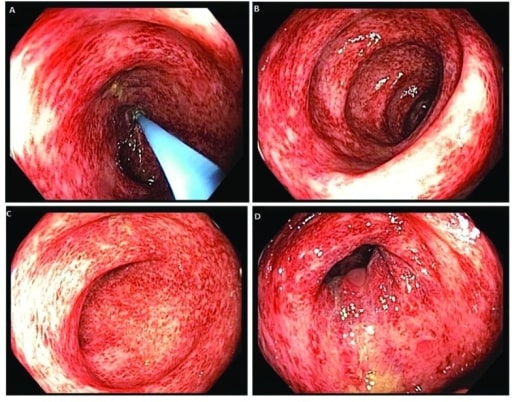Playlist
Show Playlist
Hide Playlist
GI Bleed: Management
-
Emergency Medicine Bord GI Bleed.pdf
-
Download Lecture Overview
00:01 So what do we want to do for our patients? We want to ensure that they have 2 large bore IVs, that's a greater than 18-gauge size. 00:09 So either 14, a 16, or an 18 gauge IV. 00:13 If you're not able to get one of those, go ahead and IO access, so intra-osseous access, or a Cordis for volume resuscitation would be your next choices. 00:23 If a patient has unstable vital signs, you want to give them uncrossmatched blood. 00:28 So you don't want to wait for that typing cross procedure. 00:31 Patients who are unstable and have evidence of bleeding can get uncrossmatched blood. 00:36 Generally, that's O negative blood for women of child bearing age, and for women who are older than child-bearing age and men, that could be O positive blood. 00:48 You want to reverse coagulopathy. 00:50 That's done by a variety of mechanisms depending on what anticoagulant the patient is on, so you can go ahead, some things are reversible with FFP, some things are reversible with PCC, so prothrombin concentrate. 01:04 So there's various ways to reverse different anticoagulation. 01:09 Now, for patients who have massive hematemesis, who are throwing up large volumes of that bright red blood, they potentially may not be able to adequately protect their airway. 01:18 If you're in that situation, those patients need to be intubated emergently. 01:22 And go ahead and get stuff ready to intubate that patient. 01:27 So for GI bleeds, we do sometimes need to involve our consultants. 01:31 So for patients who have upper GI bleeds, who are vomiting blood or have that coffee ground emesis, patients in whom we were concerned have a peptic ulcer, gastroenterology is generally the right service to involve. 01:43 They potentially may want to do an endoscopy or give that patient some additional medications. 01:48 Definitely, a surgical consult for a patient in whom you're concerned about perforation or for that lower GI bleed patient due to diverticulosis or aortoenteric fistula, they may benefit from surgical interventions. 02:02 So what medications can we give? So we talked about blood, and I want to stress that blood is one of the most important things that you can give for these patients. 02:08 So you want to be able to start volume resuscitating them if you're worried and concerned that they have significant bleeding and are hemodynamically unstable. 02:16 But what other things do we have to offer these patients? So for patients with an upper GI bleed, again, one of the more common causes here is peptic ulcer disease. 02:26 For those patients, you can give them IV omeprazole. 02:29 So you give that medication via infusion to the patient and that will help decrease the acid secretion in the stomach. 02:37 For patients in whom you're worried they have a variceal bleed, so they have a history of liver disease or they have a known history of esophageal varices, the medication that you want to give them is Octreotide. 02:47 For patients who are known cirrhotics, you want to go ahead and also add on antibiotic medication, either Ceftriaxone or Ciprofloxacin. 02:56 That's due to the fact that in these patients when they have GI bleeds, it can cause bacteria to enter the blood stream and in those situations, you want to make sure that you pre-treat them with antibiotics. 03:07 Other medications to consider would be a gastric motility agent. 03:11 And these agents like erythromycin or metoclopramide are used if a patient may be going for endoscopy because in order to perform the endoscopy, you need the stomach to be emptied of the blood. 03:22 So these agents may help just move things along in the stomach and get better visualization for the gastroenterologist when they go to take a look with the camera. 03:33 So for patients with GI bleed, endoscopy within 24 hours of presentation for severe bleeding. 03:40 This is performed by a gastroenterologist generally, and they take a camera and they look in the stomach and they see if there's any evidence of bleeding or a peptic ulcer disease. 03:50 For patients who have esophageal varices especially if they're having lots of bleeding, and lots of human emesis, in the Emergency Department you can consider placing, doing balloon tamponade, using something called a Sengstaken-Blakemore tube. 04:05 That's a tube, it's a pretty large-bore tube and you basically go and place it within the esophageal area and you blow up a large balloon and that creates a tamponade effect. 04:16 So it creates, it pushes against the blood vessels, and ideally, will help them stop bleeding and will aid in that process. 04:24 Now, if the bleeding does not stop with other measures, again, you want to maybe talk to your surgical team. 04:29 The patient may benefit from going to the operating room depending on the cause of the bleeding and what else is going on with the patient. 04:36 Now, we always want to think about risk factor, so what puts patients at risk for this? So higher risks are patients who are over 65 years of age, patients who are in shock, patients who have a poor overall health status, who have co-morbid conditions, so they have lots of other medical problems, low initial hemoglobin levels, if they have melena, so that dark tarry stool that we talked about. 05:00 if they require transfusion, if they have fresh red blood on rectal examination, and their emesis, or possibly on the NG aspirate. 05:09 If they also concomitant sepsis, if they have elevated urea, creatinine, or serum aminotransferase levels, and also if they're on anticoagulation. 05:19 All of these things put patients at risk for having complications related to GI bleed and for having higher morbidity and mortality. 05:28 There's also other risk stratification rules, so for upper GI bleed, there are two rules - the Blatchford and clinical Rockall scoring that can be used to help for stratify patients, and to figure out whose more sick and who is less sick or to help you kind of sort that out a little bit with the admission team. 05:44 For lower GI bleed, the Oakland score can help identify low risk patients who may be managed as an outpatient. 05:51 In all situations, go ahead and kind of think about the patient, and work in conjunction with your consultants to figure out the next steps for the patient. 06:00 So our conclusions here, always make sure you're thinking about and developing a differential diagnosis for patients who present with GI bleed. 06:09 You want to think about other sources of bleeding. 06:12 So is it a nosebleed or hemoptysis, because all of that would potentially change what you do. 06:17 You want to complete that focused history and physical exam, and discuss initial tests. 06:23 We want to discuss initial testing, imaging and management for GI bleed. 06:27 So our initial testing will always involve our typing, crossmatch, consider potential imaging and then also to consider potential medication administration. 06:36 And then we also want to think about the prognostic factors and sort out the disposition for thess patients with the GI bleed.
About the Lecture
The lecture GI Bleed: Management by Sharon Bord, MD is from the course Abdominal and Genitourinary Emergencies.
Included Quiz Questions
Which blood type is recommended to give to a female in her 20s, presenting to the ED with massive GI bleeding and unstable vital signs?
- O negative
- O positive
- A positive
- A negative
- B negative
What is the medication of choice in patients with variceal bleeding?
- Octreotide
- Omeprazole
- Erythromycin
- Ciprofloxacin
- Metoclopramide
What intervention can be used to temporize an unstable patient with an upper GI bleed due to esophageal varices?
- Balloon tamponade
- Cauterization
- Intubation
- Coagulation
- Endoscopy
Customer reviews
5,0 of 5 stars
| 5 Stars |
|
5 |
| 4 Stars |
|
0 |
| 3 Stars |
|
0 |
| 2 Stars |
|
0 |
| 1 Star |
|
0 |




